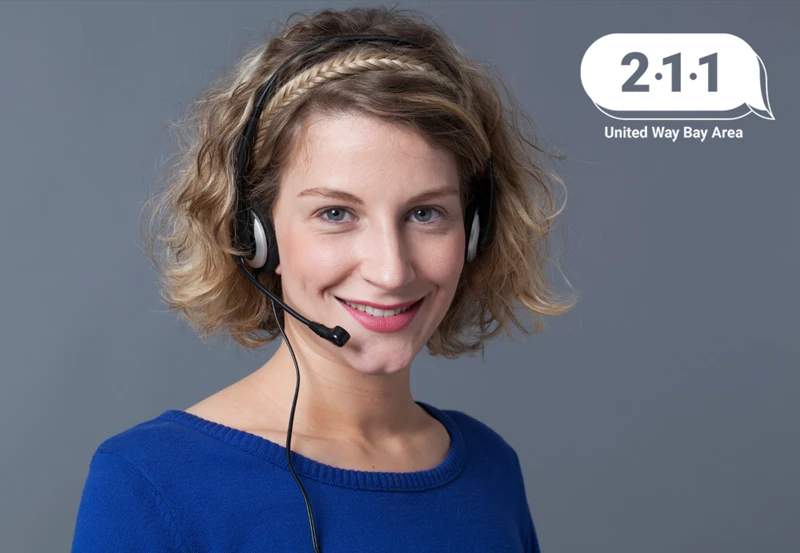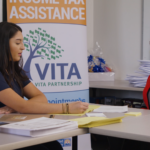Search
One-on-One with 211
A View from the Inside with a Call Specialist
April 1, 2024

Imagine finding yourself facing an unforeseen crisis, and with limited options, you might pick up a phone and dial three little numbers – 2-1-1, hoping to find a lifeline that reassures you that it’s going to be okay. 211 is a free helpline where trained specialists connect those in need with the right health and human services in their community.
We had the rare opportunity to sit down with Lacey, a dedicated 211 Call Specialist who is combining her own lived experience with her passion for helping others into a lasting commitment to serve. She shares insights into her role at 211, the impact of empathy in every call, and the importance of making sure this vital resource remains available for all who need it.
How long have you been a 211 specialist and what inspired you to do this work?
I’ve been with 211 since 2021. I have always wanted to work with people and to be able to help them in a way that I didn’t have the opportunity given to me growing up. I heard about 211 back in 2016. I almost lost housing for myself and wouldn’t have had anywhere to go. My partner reached out to 211 and was talking to me about the resources offered when we were trying to figure out where to go.
I’ve always had a passion for helping people, and a lot of the different people that I speak with, I relate to so much. So, I’m very passionate about helping these individuals and making sure they have a voice and can get the help they’re looking for when they need it. I want to make it as personable as possible to let them know that this call is specifically for them.
What does your role entail, and why do you believe the personal touch is important in your calls?
I feel it’s important because maybe that’s the only time they’re going to really get help. I have had a lot of callers tell me that they kind of get [shut down] when they’re looking for help or depending on their living situation. You know, they feel that they’re being looked down upon, or they don’t have any loved ones or friends, or any other organizations that they feel comfortable with to get help. They’re just kind of turned away a lot. I want them to feel that, you know, they’re being heard, and their needs are being met in that time.
Sometimes callers are going through a lot, and may not be, you know, warm and approachable in that call. So sometimes it can be difficult, sometimes they can be very emotional, they can be very upset, sometimes they could be going through something very, very serious. But [I] just try and pull back a bit and look at it. They’re going through something, they’re really needing help, and they’re being vulnerable to even reach out for help. So, I want to reach them in a way that works for them.
Are there callers that stick out or always come to mind when you think about this work?
My domestic violence callers. Especially when they’re looking for shelter, and they’re trying to find somewhere safe, and they’ve tried every [local] shelter.
I had a gal; I remember she was hiding in the hallway somewhere in her apartment complex from her partner who was her abuser. I think she had her child with her at that time. She was hiding and she was in great, great fear. I offered her assistance to contact the police she agreed. The dispatch was going to stay on the phone with my caller until police personnel arrived to get her somewhere safe. But that call will always stick with me.
I can only imagine how difficult that must’ve been. What would you say is the most common type of call you receive?
There’s actually a few. I get frequent calls about people needing help with their power bills.
Their Electric Company is just not being helpful to them. They offer them other solutions when they’re literally at rock bottom and they don’t have the capacity or the means to pay. It makes it hard for them. So, they reach out to us, and we provide them whatever [we can].
Other calls are those that are either at risk of losing or are already without housing and need help finding a shelter that will take them by themselves or with their partner or their children.
A lot of times I get seniors, and that can even be hard. Because, depending on that person’s physical limitations, a lot of the shelters [won’t] have staff that’s equipped to make sure that they can get the help [they need] while they’re in the shelter.
If it’s my first time calling, asking for help can be difficult, what can I expect when I get in touch with you?
If you’re getting in touch with me for the first time, especially if you’re nervous, I just try to let you know that it’s okay. It’s okay to repeat things, [it’s okay to] ask questions. If you need clarification, I’m happy to oblige.
I will assure you that you can take your time – there’s no rush on the call. You can also expect us to look for the resources that you need, and to check to see if there’s anything else you need outside of what you’re originally asking. I go through the database to find the appropriate resources that would meet your needs, and we can also follow up with you to make sure those resources were helpful. I do encourage my callers if they disconnect from us and they feel like there’s something else I wanted to ask for, that we’re 24/7 – so they can call us back. I want to make sure you understand what we do, and what we offer, and to make sure we’re finding what works [best] for you.
What [often] happens when a caller calls for one specific thing, there’s actually more than just one thing. So, we ask assessment questions like, if they’re asking for rental assistance, how many months behind are you in rent? What led you to be behind in rent? Was there a family emergency? Did you lose your job?
It’s just to see if there’s more than what they’re initially stating. A lot of times there is – they were caring for a loved one, or they got sick or injured, or had just lost their job. They’ve just received a pay or quit notice or gotten an eviction notice. I can offer them additional resources to speak with someone regarding their tenant rights for legal aid, [other] resources that might be supportive in that situation.
I’ve [also] had callers that tell me they’re looking for a particular resource. And on that call, you know, if they feel comfortable, they’ll [say], “I just want to be honest, you know, I’m not documented, I don’t have a social security number.” I can tell they’re nervous. I let them know that everything here is confidential. And the instances that they need help with rent or other services like health insurance or food stamps – I know that can impact what’s available to them. Even with low-income housing, that can be limited as well. And it’s disheartening because I wish that I could offer them more. Unfortunately, I have to go based on what’s there and I try to look for [other] resources that can still [meet] most of the same needs.
But I [have to] encourage them to try with friends or family, even local churches to facilitate other options outside of what I can give to them.
With that, how does 211 maintain confidentiality for callers?
We keep call notes to ensure continuity, but we approach each call with a fresh perspective for the caller’s safety and privacy. However, we do not save any identifying information like the name or address of the caller, and we do not share any information regarding 211 calls with anyone. The only exception is mandated reporting or contacting emergency services as a result of a crisis. This is important because our goal is to make the community feel safe when calling while being a consistent, reliable source of support.
Finally, what do you want people to know about the service that 211 provides?
Many people don’t realize we’re a 24/7 service and are surprised by the wide range of help we offer. I wish more people knew about us; it could make a huge difference in so many lives.
211 is more than an emergency hotline; it’s a community support system available for any need, any time. We’re here to help, and just a phone call away.
In times of crisis, a simple phone call can be a lifeline—this is the promise of 211. With government funding for 211 in flux, your donation is critical to ensuring specialists like Lacey can continue to answer urgent calls for help around the clock. From mothers fleeing domestic violence to families facing eviction, the calls are diverse, but the need is the same: immediate, compassionate assistance.
Your action today is more than a contribution; it’s a commitment to upholding our community’s promise of support and safety. Donate now.
Ready to learn more about how 211 works in a community? Read one of our caller stories from Jamila, or if you want to know how 211 fits into our broader network of Bay Area resources, watch Episode 5 of our brand new series JUST A MOMENT.
*The image has been changed to maintain privacy.


